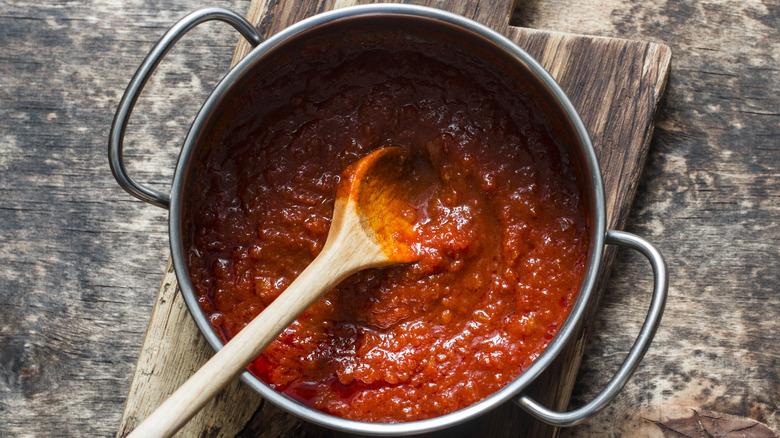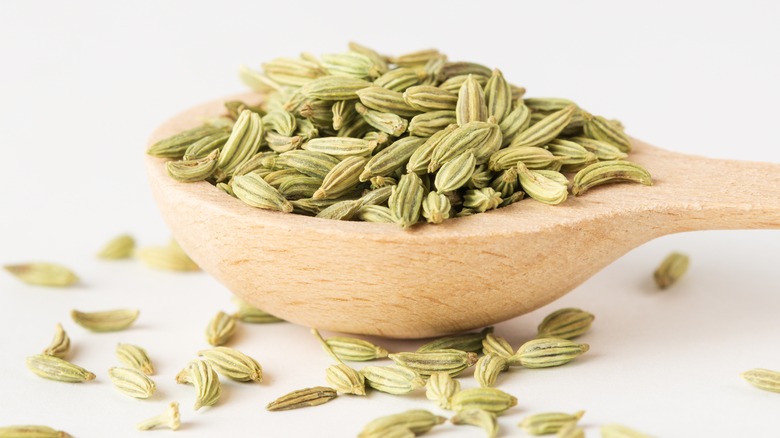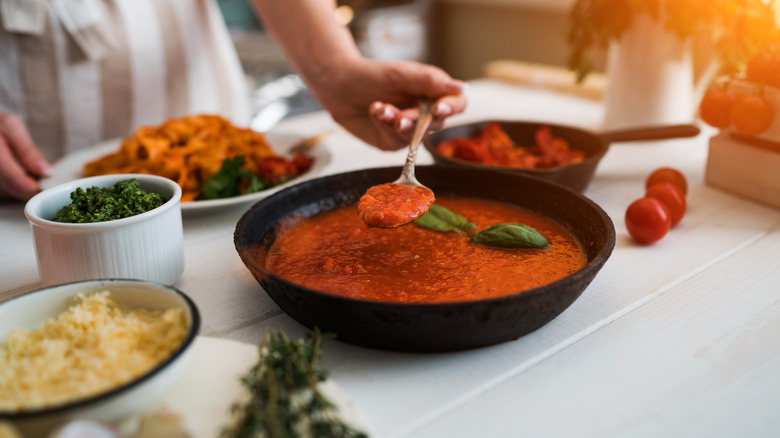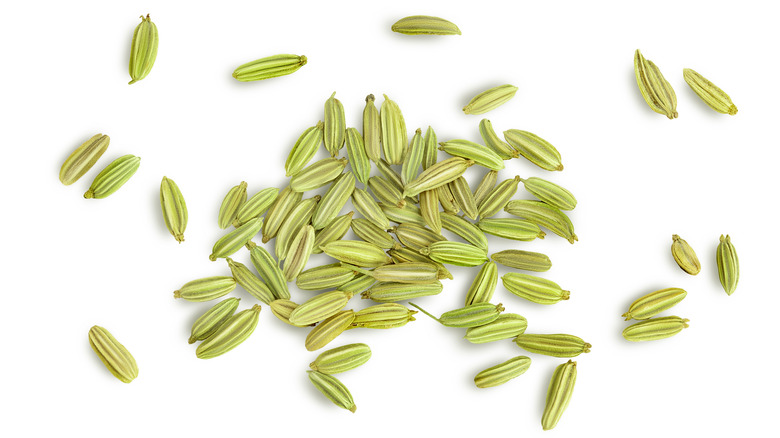The Flavorful Spice You Should Be Adding To Tomato Sauce
Pasta lovers know that what makes a good sauce is all in the details. While crafting tomato sauce from scratch is well worth the labor, store-bought sauce can also perform dinnertime miracles with the help of a few extra ingredients — it's a matter of working smarter, not harder. Regardless of which sauce-making path you take, adding some well-chosen spices is always a great way to enhance flavor.
Don't get us wrong, even the plainest of sauces still happen to pack a significant amount of punch thanks to their star ingredient, tomatoes. Overwhelmingly juicy, it's the sweet and sour dichotomy of the ruby red fruits that renders them such a versatile and giving ingredient. Naturally, adding a few other things to highlight the greatness of the tomato can only intensify the tasting experience.
To take sauce to the next level, frying up ground meat or sautéeing veggies is a great starting point. From there, you could try other clever tricks, like adding anchovies or a splash of tangy mozzarella water. However, the easiest way to give tomato sauce an edge is obviously by simply stirring in spices — but rather than sprinkle in chili flakes or earthy oregano, there's another flavorsome (yet, sometimes forgotten) spice that can turn any simple sauce into a thing of wonder.
Don't forget about how fantastic fennel can be
Among the many tips that chefs have to improve tomato sauce, sometimes the secret lies in the simplest of ingredients. Chef Michael Bertozzi of The Kitchen Restaurant Group shared with Insider that, since tomato and fennel pair so well together, tossing a tablespoon of fennel seeds into a red sauce is a no-brainer – just make sure to toast little green seeds beforehand to wake up their warm aromas and flavors.
But you don't want to go throwing in whole toasted seeds, which can be unpleasant to bit into. Bertozzi and Ina Garten both recommend chopping up the seeds, while some cooks like to incorporate ground fennel seed for an even less noticeable bite. Interestingly, breaking down the spice through grinding or chopping can offer a more robust taste, releasing more of those intensely sweet yet earthy and licorice-like flavors as it cooks into the acidic sauce. The only remaining question is whether or not there's an ideal time to work the spice into the sauce.
It matters when you add the spices
Unfortunately, there is no one "best" time to add fennel seeds (or other spices) to your tomato sauce. While it may seem like you can add spices to your sauce at any point in the cooking process, given that dried herbs and spices are, well, dried, they tend to require a bit more time to really infuse into a sauce. However, If you're using dried aromatics that have already been ground, they can instead be combined near the end of the cooking process since ground spices release flavor more quickly.
Consequently, adding ground fennel to a sauce too early would instead cause it to lose some of its intensity, which defeats the whole purpose of adding the bold spice. So the next time you whip up a big pot of tomato sauce, don't skimp out on the flavor that fennel has to offer — your tastebuds will thank you for it.
What are fennel seeds and how to properly store them
As you can probably guess by the name, fennel seeds are the seeds of the herb fennel, which looks a bit like if you took the base of celery and topped it with a bunch of fresh dill. The seeds can be found in the spice aisle of just about any grocery store: from Walmart to Whole Foods, as well as local grocers and specialty shops. A common ingredient in Italian cooking, fennel seed is also used in fish dishes, curries, and chutneys. The seeds are also eaten after dinner (sometimes coated in candy!) as they can help with bad breath and may aid with digestion. You may even already have fennel lurking in your spice cabinet and not even know it; Fennel can be found in spice blends like Chinese five spice and panch phoron (also known as Bengali five spice).
Fennel seeds should be stored in a cool, dark space (like your pantry) and in an airtight container to prevent them from going stale. Properly stored, the spice can last up to four years, but quality may begin to degrade around year two. To tell if your spice is past its prime, you'll want to roll the seed around with your fingers or lightly crush it and then give it a sniff. If you're unable to smell your fennel seed, it's very likely you won't be able to taste it in your tomato sauce either.



